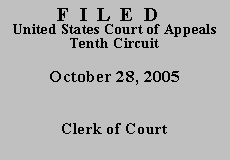

| UNITED STATES OF AMERICA, |
|
| v. | |
| RAUL ATAYDE, |
|
On March 24, 2005, Mr. Atayde signed and mailed a motion to vacate his sentence under 28 U.S.C. § 2255. The motion was filed with the district court on March 28, 2005. Relying on Blakely v. United States, 524 U.S. 296 (2004), and United States v. Booker, 125 S. Ct. 738 (2005), it alleges (1) a due process violation because the judge was unaware of his sentencing discretion and (2) a violation of his right to a jury trial. The district court denied the motion as barred by the statute of limitations, and denied a request for a certificate of appealability (COA). Mr. Atayde now seeks a COA from this court.
"A certificate of appealability may issue . . . only if the applicant has made a substantial showing of the denial of a constitutional right." 28 U.S.C. § 2253(c)(2). This means that the applicant must show "that reasonable jurists could debate whether (or, for that matter, agree that) the petition should have been resolved in a different manner or that the issues presented were adequate to deserve encouragement to proceed further." Slack v. McDaniel, 529 U.S. 473, 484 (2000) (internal quotation marks omitted). In other words, the applicant must show that the district court's resolution of the constitutional claim was either "debatable or wrong." Id. If the petition was denied on procedural grounds, the applicant faces a double hurdle. Not only must the applicant make a substantial showing of the denial of a constitutional right, but he must also show "that jurists of reason would find it debatable . . . whether the district court was correct in its procedural ruling." Id. "Where a plain procedural bar is present and the district court is correct to invoke it to dispose of the case, a reasonable jurist could not conclude either that the district court erred in dismissing the petition or that the petition should be allowed to proceed further." Id. Mr. Atayde has not met this burden.
We review the district court's factual findings for clear error and its legal conclusions de novo. English v. Cody, 241 F.3d 1279, 1282 (10th Cir. 2001). The district court correctly found that Mr. Atayde's motion was barred. His sentence became final on February 23, 2004, when the Supreme Court denied his petition for a writ of certiorari. See United States v. Willis, 202 F.3d 1279, 1280-81 (10th Cir. 2000). His motion for habeas relief was mailed on March 24, 2005. Under the "prison mailbox rule" this is the date on which the motion was filed for purposes of 28 U.S.C. § 2255. See Price v. Philpot, 420 F.3d 1158, 1163-64 (10th Cir. 2005). Mr. Atayde's motion was therefore filed more than one year after his date of conviction became final and is barred by the statute of limitations in 28 U.S.C. § 2255.
Mr. Atayde argues that he had one year from Booker to file his claim. He would be correct if Booker were "retroactively applicable to cases on collateral review." 28 U.S.C. § 2255. But Booker is not retroactively applicable, and neither is Blakely. See United States v. Bellamy, 411 F.3d 1182, 1186-88 (10th Cir. 2005). Mr. Atayde attempts to overcome this by arguing that his claim is based on Hicks v. Oklahoma, 447 U.S. 343 (1980). In that case the Supreme Court held that a defendant was prejudiced by an instruction that required the jury to impose a 40-year prison sentence, thereby removing all discretion from the jury, in violation of Oklahoma state law. From this, Mr. Atayde argues that he was denied due process because the judge in his case was confined by unconstitutional guidelines when he should have had more discretion. But even though Mr. Atayde relies on Hicks, that case avails him nothing without Booker, which, as noted, we do not apply retroactively to cases on collateral review.
Finally, Mr. Atayde argues that this procedural bar is overcome by the actual-innocence exception. See United States v. Cervini, 379 F.3d 987, 991 (10th Cir. 2004). But he does not even allege any new evidence disputing the facts found by the court at sentencing, and his bare assertions are not enough. See Schlup v. Delo, 513 U.S. 298, 327 (1995) ("To establish [actual innocence], the petitioner must show that it is more likely than not that no reasonable juror would have convicted him in the light of the new evidence.").
We DENY a COA and dismiss the appeal.
ENTERED FOR THE COURT
Harris L Hartz
Circuit Judge